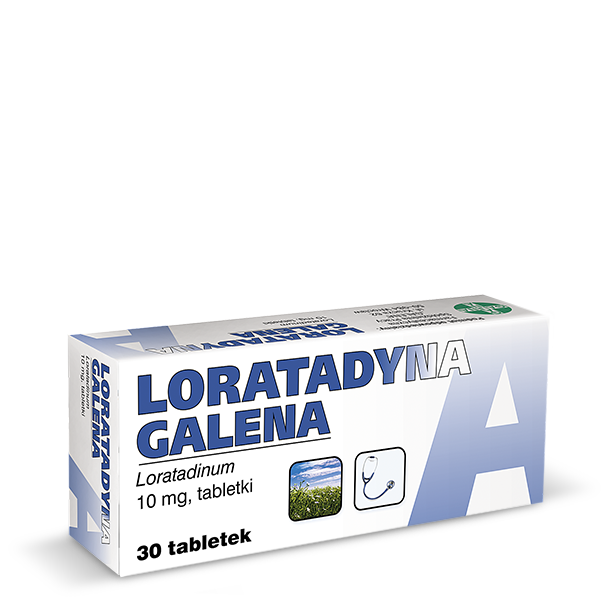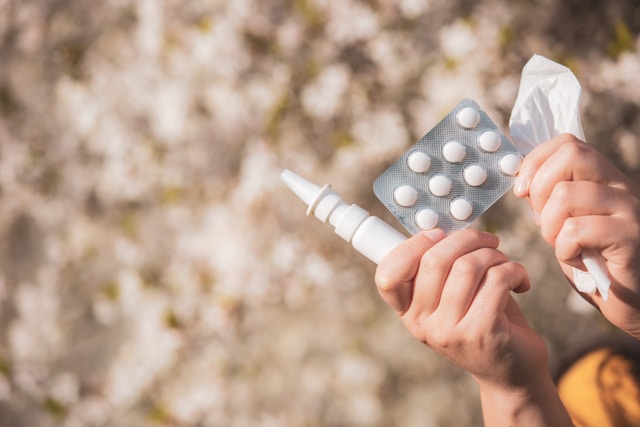

Loratadina Galena

Ask a doctor about a prescription for Loratadina Galena

How to use Loratadina Galena
Leaflet attached to the packaging: patient information
LORATADINE GALENA
10 mg, tablets
Loratadine
Read the leaflet carefully before taking the medicine, as it contains important information for the patient.
- Keep this leaflet, so you can read it again if you need to.
- If you have any doubts, consult your doctor or pharmacist.
- This medicine has been prescribed specifically for you. Do not pass it on to others. The medicine may harm another person, even if their symptoms are the same.
- If you experience any side effects, including those not listed in this leaflet, tell your doctor or pharmacist. See section 4.
Table of contents of the leaflet
- 1. What is Loratadine Galena and what is it used for
- 2. Important information before taking Loratadine Galena
- 3. How to take Loratadine Galena
- 4. Possible side effects
- 5. How to store Loratadine Galena
- 6. Package contents and other information
1. What is Loratadine Galena and what is it used for
Loratadine Galena is an antiallergic medicine.
Loratadine Galena is indicated for the relief of symptoms such as sneezing, runny nose and itchy nose, as well as itchy and burning eyes, caused by seasonal and perennial allergic rhinitis.
Loratadine Galena is also indicated for the relief of symptoms of chronic idiopathic urticaria (itching, skin redness).
2. Important information before taking Loratadine Galena
When not to take Loratadine Galena
Warnings and precautions
Before taking Loratadine Galena, discuss it with your doctor.
Be particularly cautious in patients with impaired liver function (see section 3 "How to take Loratadine Galena").
Consult your doctor, even if the above warnings apply to past situations.
Stop taking the medicine about 48 hours before skin tests, as loratadine may cause false-negative results (the medicine may reduce or completely inhibit the skin reaction that would normally be positive).
Children
Safety and efficacy have not been established, so Loratadine Galena should not be used in children under 2 years of age.
Using Loratadine Galena in patients with kidney or liver impairment
In patients with severe liver impairment, a lower initial dose should be used (see section 3 "How to take Loratadine Galena").
No dose adjustment is needed in patients with kidney impairment.
Using Loratadine Galena in elderly patients
No dose adjustment is needed in elderly patients.
Loratadine Galena and other medicines
Tell your doctor about all medicines you are taking or have recently taken, as well as any medicines you plan to take.
Taking loratadine with cimetidine, erythromycin, or ketoconazole increases the loratadine concentration in the blood, so caution should be exercised when taking these medicines together.
Taking loratadine with certain medicines that affect liver metabolism, such as CYP3A4 or CYP2D6 inhibitors, increases the loratadine concentration in the blood, which may cause increased side effects.
Loratadine Galena with food, drink, or alcohol
Loratadine Galena can be taken with or without food.
Alcohol does not enhance the effect of loratadine, but you should not drink alcohol during treatment.
Pregnancy, breastfeeding, and fertility
If you are pregnant or breastfeeding, think you may be pregnant, or plan to have a child, consult your doctor before taking this medicine.
Loratadine Galena should be avoided during pregnancy.
Since loratadine passes into breast milk, it should not be used in breastfeeding women.
There is no data on the effect of Loratadine Galena on fertility.
Driving and using machines
In clinical trials, loratadine did not affect or had a negligible effect on the ability to drive and use machines. However, during treatment, some people may experience drowsiness, which may impair the ability to drive and use machines.
Therefore, caution should be exercised when taking the medicine.
3. How to take Loratadine Galena
Always take this medicine exactly as your doctor has told you. If you are not sure, ask your doctor.
The tablet can be divided into halves.
Recommended dose
Children and adolescents
For children aged 2 to 12 years, the dose depends on body weight:
For children over 12 years: 10 mg (1 tablet) once a day.
Safety and efficacy have not been established in children under 2 years of age.
Adults
10 mg (1 tablet) once a day.
Elderly patients
No dose adjustment is needed in elderly patients.
Patients with kidney impairment
No dose adjustment is needed in patients with kidney impairment.
Patients with liver impairment
In patients with severe liver impairment, the dose of the medicine may need to be reduced. The doctor will recommend the appropriate dosage.
Method of administration
Oral administration.
The product can be taken with or without food.
If you feel that the effect of Loratadine Galena is too strong or too weak, consult your doctor.
Taking a higher dose of Loratadine Galena than recommended
After taking a higher dose than recommended, drowsiness, increased heart rate, and headache have been reported.
If you take more than the recommended dose, consult your doctor immediately.
There is no data indicating that loratadine carries a risk of abuse or dependence.
Missing a dose of Loratadine Galena
Do not take a double dose to make up for a missed dose.
Stopping treatment with Loratadine Galena
If you have any further doubts about taking this medicine, consult your doctor or pharmacist.
| Body weight over 30 kg: | Body weight under 30 kg: | |
| 10 mg (1 tablet) once a day | Children over 6 years: | Children from 2 to 6 years: |
| 5 mg (half a tablet) once a day | Not recommended for children under 6 years; for these patients, loratadine syrup (5 mg) is recommended. | |
4. Possible side effects
Like all medicines, Loratadine Galena can cause side effects, although not everybody gets them.
The frequency of possible side effects listed below is defined as follows:
- often (occurring in less than 1 in 10 people);
- uncommonly (occurring in less than 1 in 100 people);
- very rarely (occurring in less than 1 in 10,000 people);
- frequency not known (frequency cannot be estimated from the available data).
Often:
- headache, nervousness, and fatigue (in children aged 2 to 12 years),
- drowsiness (in adults and adolescents).
Uncommonly:
- headache, increased appetite, and sleep disorders (in adults and adolescents).
Very rarely:
- severe allergic reaction (including difficulty breathing, wheezing, itching, hives, swelling). If you experience these symptoms, stop taking the medicine immediately and contact your doctor or go to the nearest hospital.
- dizziness,
- seizures,
- increased heart rate, palpitations,
- nausea, dry mouth, stomach inflammation,
- abnormal liver function,
- rash, hair loss,
- fatigue.
Frequency not known:
- weight gain.
If any of the side effects get worse or if you experience any side effects not listed in this leaflet, tell your doctor or pharmacist.
Reporting side effects
If you experience any side effects, including those not listed in this leaflet, tell your doctor, pharmacist, or nurse. Side effects can be reported directly to the Department for Monitoring of Adverse Reactions to Medicinal Products of the Office for Registration of Medicinal Products, Medical Devices, and Biocidal Products:
Al. Jerozolimskie 181C
02-222 Warsaw
Phone: +48 22 49 21 301
Fax: +48 22 49 21 309
Website: https://smz.ezdrowie.gov.pl
Side effects can also be reported to the marketing authorization holder.
Reporting side effects will help to gather more information on the safety of the medicine.
5. How to store Loratadine Galena
Keep the medicine out of the sight and reach of children.
There are no special precautions for storing the medicine.
Do not use this medicine after the expiry date stated on the packaging. The expiry date refers to the last day of the month.
Medicines should not be disposed of via wastewater or household waste. Ask your pharmacist how to dispose of medicines no longer required. This will help protect the environment.
6. Package contents and other information
What Loratadine Galena contains
- The active substance is loratadine. One tablet contains 10 mg of loratadine.
- The other ingredients are: microcrystalline cellulose, maize starch, magnesium stearate.
What Loratadine Galena looks like and contents of the pack
Loratadine Galena tablets are white, round, flat, with a broken edge, with a dividing line and the number "10" embossed on one side.
Packaging: blisters of Aluminium/PVC/PVDC film in a cardboard box.
Pack sizes: 30, 60, or 90 tablets.
Not all pack sizes may be marketed.
Marketing authorization holder and manufacturer
Pharmaceutical Cooperative "GALENA"
ul. Dożynkowa 10
52-311 Wrocław
Poland
Phone: +48 71 710 62 01
Date of last revision of the leaflet:02.06.2023
- Country of registration
- Active substance
- Prescription requiredNo
- Manufacturer
- ImporterFarmaceutyczna Spółdzielnia Pracy Galena - Zakład Nr 2
- This information is for reference only and does not constitute medical advice. Always consult a licensed doctor before taking any medication. Oladoctor is not responsible for medical decisions based on this content.
- Alternatives to Loratadina GalenaDosage form: Tablets, 10 mgActive substance: loratadineManufacturer: US Pharmacia Sp. z o.o.Prescription requiredDosage form: Tablets, 5 mg + 120 mgActive substance: loratadineManufacturer: SAG MANUFACTURING, S.L.U.Prescription not requiredDosage form: Tablets, 10 mgActive substance: loratadineManufacturer: Bayer Bitterfeld GmbHPrescription not required
Alternatives to Loratadina Galena in other countries
The best alternatives with the same active ingredient and therapeutic effect.
Alternative to Loratadina Galena in Spain
Alternative to Loratadina Galena in Ukraine
Online doctors for Loratadina Galena
Discuss dosage, side effects, interactions, contraindications, and prescription renewal for Loratadina Galena – subject to medical assessment and local rules.















